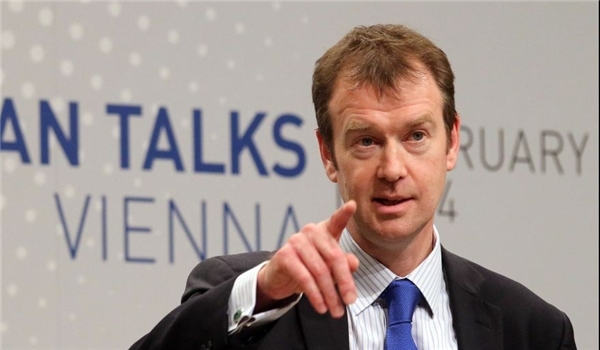 TEHRAN (FNA)- Michael Mann, the spokesman for the EU Foreign Policy Chief Catherine Ashton, announced that the negotiations underway between Iran and the Group 5+1 (the US, Russia, China, Britain and France plus Germany) are being held in a constructive and positive atmosphere.
TEHRAN (FNA)- Michael Mann, the spokesman for the EU Foreign Policy Chief Catherine Ashton, announced that the negotiations underway between Iran and the Group 5+1 (the US, Russia, China, Britain and France plus Germany) are being held in a constructive and positive atmosphere."The bilateral talks between Iranian Deputy Foreign Minister Seyed Abbas Araqchi and Deputy EU foreign policy chief Helga Schmidt were constructive and positive despite some difficulties," Mann said in an interview with Iran-based Arabic-language Al-Alam news channel on Monday.
He also said that experts of Iran and the G5+1 are holding talks to pave the ground for drafting a final deal between the two sides.
Mann dismissed time limit for ending the current round of talks, and said, "Negotiations will continue until reaching an agreement - regardless of the time it takes."
The sixth round of talks between Tehran and the G5+1 headed by Iranian Foreign Minister Mohammad Javad Zarif and EU Foreign Policy Chief Catherine Ashton officially started in Vienna early last week.
Araqchi and Schmidt also held a meeting in Vienna Sunday afternoon to discuss the draft of the final deal.
The two officials also held a meeting on Saturday morning with Michael Mann voicing satisfaction in the outcomes of their talks.
"Schmidt and Araqchi continued drafting session this morning," Mann said in his Twitter account on Saturday morning.
He said the meeting was "difficult as expected", but it was also "constructive" and reined by a "businesslike atmosphere".
On Wednesday, Zarif held a bilateral meeting with Ashton which was focused on drawing up agenda of the Vienna 6 talks.
The Iranian foreign minister also attended a tripartite meeting with Ashton and US Deputy Secretary of State William Burns later in the day.
On Thursday, Araqchi rejected some media reports alleging that Iran has reduced the number of the centrifuges that it wants to have.
A Thursday report by Reuters cited �a Western diplomat� as saying that �Iran has reduced the number of centrifuges it wants". According to the report, diplomats claimed that the Islamic Republic had signaled it would settle for a lower figure than 50,000 centrifuges.
"All the figures which are reported on the number of centrifuges are the figment of the imagination of some foreign media," Araqchi said.
Also on Thursday, the Iranian foreign minister wrote on his Facebook page that Western media speculations on the nuclear discussions between Tehran and the G5+1 should not be taken seriously as they attempt to influence the negotiations instead of reporting the events.
On Friday, Araqchi and Schmidt had another round of bilateral consultations on the final deal.
On Friday, Araqchi voiced satisfaction in the progressive trend of the sixth round of nuclear talks between Iran and the six major world powers in Vienna, but cautioned the world powers and international bodies not to try to include new issues in the negotiations.
The UN High Commissionaire for Human Rights Navi Pillay had on Thursday in a press conference on the sidelines of the Vienna nuclear negotiations between Iran and the G5+1 requested the western negotiating delegations to include human rights issue in Iran in their nuclear negotiations with Tehran in full details.
"All the sides of these negotiations, too, are fully aware of the fact that the human rights issue is totally unrelated to the matter of discussions in our ongoing nuclear talks," Araqchi pointed out.
Also in a video message on the eve of the new round of the talks with the six world powers on Wednesday, Zarif asked his counterparts from the sextet not to miss the present opportunity for striking a deal with Iran and putting an end to an unnecessary crisis.
Iran and the Group 5+1 sealed an interim deal in the Swiss city of Geneva on November 24, 2013 to pave the way for a full resolution of their decade-old dispute over the former�s nuclear standoff with the West. The deal came into force on January 20.
Under the Geneva deal, dubbed the Joint Plan of Action, the six countries undertook to provide Iran with some sanctions relief in exchange for Tehran agreeing to limit certain aspects of its nuclear activities during a six-month period.
Zarif told reporters after the latest round of talks with the six world powers held in Vienna on June 16-20 that although the seven nations have started compiling the draft deal, the harsh stance taken by the western powers, which is reflected in their excessive and maximum demands shows that they are not fully ready to enter serious negotiations to attain a final solution to the decade-old standoff.
He stressed that Iran would not give up its rights, and would continue resistance until restoring all its nuclear rights.
By Fars News Agency
The Iran Project is not responsible for the content of quoted articles.











